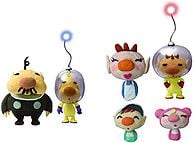Hocotatian: Difference between revisions
No edit summary |
|||
| Line 5: | Line 5: | ||
==Anatomy== | ==Anatomy== | ||
Hocotatians bear multiple resemblances to humans, including expressing human-like emotions; physically, Hocotatians have a humanoid shape, the main difference being a larger head-to-body ratio. However, their eyes are very different than humans' eyes: their shape changes for showing emotions because Hocotatians do not have eyebrows; in "neutral" shape the pupil is as big as the entire eye, and that is why some people think they are closed. In "surprise" shape, eyes are just like humans' eyes, this can be seen in a ''[[Pikmin 2]]'' cutscene shown after completing the debt, and every time Olimar is hit in ''[[Super Smash Bros. Brawl]]''. | Hocotatians bear multiple resemblances to humans, including expressing human-like emotions; physically, Hocotatians have a humanoid shape, the main difference being a larger head-to-body ratio. However, their eyes are very different than humans' eyes: their shape changes for showing emotions because Hocotatians do not have eyebrows; in "neutral" shape the pupil is as big as the entire eye, and that is why some people think they are closed. In "surprise" shape, eyes are just like humans' eyes, this can be seen in a ''[[Pikmin 2]]'' cutscene shown after completing the debt, and every time Olimar is hit in ''[[Super Smash Bros. Brawl]]''. Most of them also have big, round noses, though [[Character B|B]] was shown to have a smaller one. | ||
However, their respiratory system works in an opposite or at least different way from regular humans. While oxygen is one of the keys to human survival, it's incredibly toxic to the Hocotations. Unfortunately, the [[Planet of the Pikmin]]'s atmosphere has high amounts of oxygen. | However, their respiratory system works in an opposite or at least different way from regular humans. While oxygen is one of the keys to human survival, it's incredibly toxic to the Hocotations. Unfortunately, the [[Planet of the Pikmin]]'s atmosphere has high amounts of oxygen. | ||
Revision as of 15:49, August 11, 2012
Hocotatians are apparently the dominant race of the planet Hocotate. They are referred to as "Hocotatians" in The Ship's announcement of the Massive Receptacle Series. They are about the size of a nickel (~2cm, ~0.7in), and appear to be more advanced than humans, and have superior, or at least equal intelligence. They are capable of efficient extraterrestrial exploration and interaction, and use devices far beyond the current technology of humans. Their primary means of communication is speech, and they are able to read and write.
Anatomy
Hocotatians bear multiple resemblances to humans, including expressing human-like emotions; physically, Hocotatians have a humanoid shape, the main difference being a larger head-to-body ratio. However, their eyes are very different than humans' eyes: their shape changes for showing emotions because Hocotatians do not have eyebrows; in "neutral" shape the pupil is as big as the entire eye, and that is why some people think they are closed. In "surprise" shape, eyes are just like humans' eyes, this can be seen in a Pikmin 2 cutscene shown after completing the debt, and every time Olimar is hit in Super Smash Bros. Brawl. Most of them also have big, round noses, though B was shown to have a smaller one.
However, their respiratory system works in an opposite or at least different way from regular humans. While oxygen is one of the keys to human survival, it's incredibly toxic to the Hocotations. Unfortunately, the Planet of the Pikmin's atmosphere has high amounts of oxygen.
Life style
Hocotatians are a commercialized civilization, their currency being the Poko; commercial service and office exist in Hocotatian culture as well, with references to loan companies, along with the co cept of loan sharks. The species has similar family structures to modern day western cultures: that is, husband, wife, children (normally a daughter and a son), and even pets.
